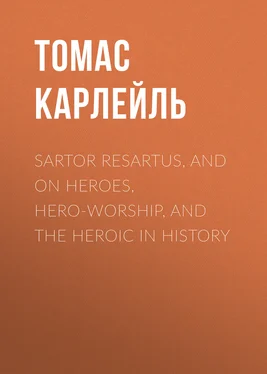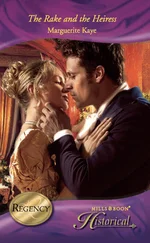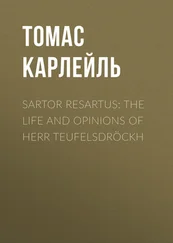Томас Карлейль - Sartor Resartus, and On Heroes, Hero-Worship, and the Heroic in History
Здесь есть возможность читать онлайн «Томас Карлейль - Sartor Resartus, and On Heroes, Hero-Worship, and the Heroic in History» — ознакомительный отрывок электронной книги совершенно бесплатно, а после прочтения отрывка купить полную версию. В некоторых случаях можно слушать аудио, скачать через торрент в формате fb2 и присутствует краткое содержание. Жанр: foreign_prose, literature_19, foreign_antique, на английском языке. Описание произведения, (предисловие) а так же отзывы посетителей доступны на портале библиотеки ЛибКат.
- Название:Sartor Resartus, and On Heroes, Hero-Worship, and the Heroic in History
- Автор:
- Жанр:
- Год:неизвестен
- ISBN:нет данных
- Рейтинг книги:4 / 5. Голосов: 1
-
Избранное:Добавить в избранное
- Отзывы:
-
Ваша оценка:
- 80
- 1
- 2
- 3
- 4
- 5
Sartor Resartus, and On Heroes, Hero-Worship, and the Heroic in History: краткое содержание, описание и аннотация
Предлагаем к чтению аннотацию, описание, краткое содержание или предисловие (зависит от того, что написал сам автор книги «Sartor Resartus, and On Heroes, Hero-Worship, and the Heroic in History»). Если вы не нашли необходимую информацию о книге — напишите в комментариях, мы постараемся отыскать её.
Sartor Resartus, and On Heroes, Hero-Worship, and the Heroic in History — читать онлайн ознакомительный отрывок
Ниже представлен текст книги, разбитый по страницам. Система сохранения места последней прочитанной страницы, позволяет с удобством читать онлайн бесплатно книгу «Sartor Resartus, and On Heroes, Hero-Worship, and the Heroic in History», без необходимости каждый раз заново искать на чём Вы остановились. Поставьте закладку, и сможете в любой момент перейти на страницу, на которой закончили чтение.
Интервал:
Закладка:
Among the earliest tools of any complicacy which a man, especially a man of letters, gets to handle, are his Class-books. On this portion of his History, Teufelsdröckh looks down professedly as indifferent. Reading he ‘cannot remember ever to have learned’; so perhaps had it by nature. He says generally: ‘Of the insignificant portion of my Education, which depended on Schools, there need almost no notice be taken. I learned what others learn; and kept it stored-by in a corner of my head, seeing as yet no manner of use in it. My Schoolmaster, a downbent, brokenhearted, underfoot martyr, as others of that guild are, did little for me, except discover that he could do little: he, good soul, pronounced me a genius, fit for the learned professions; and that I must be sent to the Gymnasium, and one day to the University. Meanwhile, what printed thing soever I could meet with I read. My very copper pocket-money I laid-out on stall-literature; which, as it accumulated, I with my own hands sewed into volumes. By this means was the young head furnished with a considerable miscellany of things and shadows of things: History in authentic fragments lay mingled with Fabulous chimeras, wherein also was reality; and the whole not as dead stuff, but as living pabulum, tolerably nutritive for a mind as yet so peptic.’
That the Entepfuhl Schoolmaster judged well, we now know. Indeed, already in the youthful Gneschen, with all his outward stillness, there may have been manifest an inward vivacity that promised much; symptoms of a spirit singularly open, thoughtful, almost poetical. Thus, to say nothing of his Suppers on the Orchard-wall, and other phenomena of that earlier period, have many readers of these pages stumbled, in their twelfth year, on such reflections as the following? ‘It struck me much, as I sat by the Kuhbach, one silent noontide, and watched it flowing, gurgling, to think how this same streamlet had flowed and gurgled, through all changes of weather and of fortune, from beyond the earliest date of History. Yes, probably on the morning when Joshua forded Jordan; even as at the midday when Cæsar, doubtless with difficulty, swam the Nile, yet kept his Commentaries dry,—this little Kuhbach, assiduous as Tiber, Eurotas or Siloa, was murmuring on across the wilderness, as yet unnamed, unseen: here, too, as in the Euphrates and the Ganges, is a vein or veinlet of the grand World-circulation of Waters, which, with its atmospheric arteries, has lasted and lasts simply with the World. Thou fool! Nature alone is antique, and the oldest art a mushroom; that idle crag thou sittest on is six-thousand years of age.’ In which little thought, as in a little fountain, may there not lie the beginning of those well-nigh unutterable meditations on the grandeur and mystery of Time, and its relation to Eternity, which play such a part in this Philosophy of Clothes?
Over his Gymnasic and Academic years the Professor by no means lingers so lyrical and joyful as over his childhood. Green sunny tracts there are still; but intersected by bitter rivulets of tears, here and there stagnating into sour marshes of discontent. ‘With my first view of the Hinterschlag Gymnasium,’ writes he, ‘my evil days began. Well do I still remember the red sunny Whitsuntide morning, when, trotting full of hope by the side of Father Andreas, I entered the main street of the place, and saw its steeple-clock (then striking Eight) and Schuldthurm (Jail), and the aproned or disaproned Burghers moving-in to breakfast: a little dog, in mad terror, was rushing past; for some human imps had tied a tin-kettle to its tail; thus did the agonised creature, loud-jingling, career through the whole length of the Borough, and become notable enough. Fit emblem of many a Conquering Hero, to whom Fate (wedding Fantasy to Sense, as it often elsewhere does) has malignantly appended a tin-kettle of Ambition, to chase him on; which the faster he runs, urges him the faster, the more loudly and more foolishly! Fit emblem also of much that awaited myself, in that mischievous Den; as in the World, whereof it was a portion and epitome!
‘Alas, the kind beech-rows of Entepfuhl were hidden in the distance: I was among strangers, harshly, at best indifferently, disposed towards me; the young heart felt, for the first time, quite orphaned and alone.’ His schoolfellows, as is usual, persecuted him: ‘They were Boys,’ he says, ‘mostly rude Boys, and obeyed the impulse of rude Nature, which bids the deerherd fall upon any stricken hart, the duck-flock put to death any broken-winged brother or sister, and on all hands the strong tyrannise over the weak.’ He admits, that though ‘perhaps in an unusual degree morally courageous,’ he succeeded ill in battle, and would fain have avoided it; a result, as would appear, owing less to his small personal stature (for in passionate seasons he was ‘incredibly nimble’), than to his ‘virtuous principles’: ‘if it was disgraceful to be beaten,’ says he, ‘it was only a shade less disgraceful to have so much as fought; thus was I drawn two ways at once, and in this important element of school-history, the war-element, had little but sorrow.’ On the whole, that same excellent ‘Passivity,’ so notable in Teufelsdröckh’s childhood, is here visibly enough again getting nourishment. ‘He wept often; indeed to such a degree that he was nicknamed Der Weinende (the Tearful), which epithet, till towards his thirteenth year, was indeed not quite unmerited. Only at rare intervals did the young soul burst-forth into fire-eyed rage, and, with a stormfulness ( Ungestüm ) under which the boldest quailed, assert that he too had Rights of Man, or at least of Mankin.’ In all which, who does not discern a fine flower-tree and cinnamon-tree (of genius) nigh choked among pumpkins, reed-grass and ignoble shrubs; and forced if it would live, to struggle upwards only, and not outwards; into a height quite sickly, and disproportioned to its breadth ?
We find, moreover, that his Greek and Latin were ‘mechanically’ taught; Hebrew scarce even mechanically; much else which they called History, Cosmography, Philosophy, and so forth, no better than not at all. So that, except inasmuch as Nature was still busy; and he himself ‘went about, as was of old his wont, among the Craftsmen’s workshops, there learning many things’; and farther lighted on some small store of curious reading, in Hans Wachtel the Cooper’s house, where he lodged,—his time, it would appear, was utterly wasted. Which facts the Professor has not yet learned to look upon with any contentment. Indeed, throughout the whole of this Bag Scorpio , where we now are, and often in the following Bag, he shows himself unusually animated on the matter of Education, and not without some touch of what we might presume to be anger.
‘My Teachers,’ says he, ‘were hide-bound Pedants, without knowledge of man’s nature, or of boy’s; or of aught save their lexicons and quarterly account-books. Innumerable dead Vocables (no dead Language, for they themselves knew no Language) they crammed into us, and called it fostering the growth of mind. How can an inanimate, mechanical Gerund-grinder, the like of whom will, in a subsequent century, be manufactured at Nürnberg out of wood and leather, foster the growth of anything; much more of Mind, which grows, not like a vegetable (by having its roots littered with etymological compost), but like a spirit, by mysterious contact of Spirit; Thought kindling itself at the fire of living Thought? How shall he give kindling, in whose own inward man there is no live coal, but all is burnt-out to a dead grammatical cinder? The Hinterschlag Professors knew syntax enough; and of the human soul thus much: that it had a faculty called Memory, and could be acted-on through the muscular integument by appliance of birch-rods.
Читать дальшеИнтервал:
Закладка:
Похожие книги на «Sartor Resartus, and On Heroes, Hero-Worship, and the Heroic in History»
Представляем Вашему вниманию похожие книги на «Sartor Resartus, and On Heroes, Hero-Worship, and the Heroic in History» списком для выбора. Мы отобрали схожую по названию и смыслу литературу в надежде предоставить читателям больше вариантов отыскать новые, интересные, ещё непрочитанные произведения.
Обсуждение, отзывы о книге «Sartor Resartus, and On Heroes, Hero-Worship, and the Heroic in History» и просто собственные мнения читателей. Оставьте ваши комментарии, напишите, что Вы думаете о произведении, его смысле или главных героях. Укажите что конкретно понравилось, а что нет, и почему Вы так считаете.












